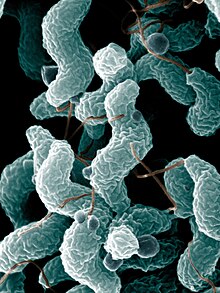Campylobacter
Campylobacter is a genus of bacteria.[1] It is found in the intestines of many types of animal. Campylobacter is the most common bacterial cause of diarrhea and food poisoning. It is spiral shaped, and moves by using its flagella.
| Campylobacter | |
|---|---|

| |
| Campylobacter jejuni | |
| Scientific classification | |
| Domain: | Bacteria |
| Phylum: | Pseudomonadota |
| Class: | Epsilonproteobacteria |
| Order: | Campylobacterales |
| Family: | Campylobacteraceae |
| Genus: | Campylobacter Sebald & Véron, 1963 |
Campylobacteriosis is a gastrointestinal tract infection caused by Campylobacter. It causes inflammation, sometimes bloody diarrhea, cramps, fever, and pain.[2][3]
Campylobacteriosis is more common during the summer months. It also appears to be more common in males than females. It is caused by eating contaminated food or drinking contaminated water. Eating raw meat or undercooked poultry, and raw dairy products are common causes.[3]
In January 2013, the UK's Food Standards Agency warned that two-thirds of all raw chicken bought from UK shops was contaminated with Campylobacter.[4] It affects about half a million people annually and kills about 100.[5]
References
change- ↑ Vandamme, Peter et al 2006. Bergey's Manual of Systematic Bacteriology: volume 2: The Proteobacteria (Part C). 2nd ed, Springer, pp. 1147–1160. ISBN 978-0-387-29298-4
- ↑ Humphrey, Tom; O'Brien, Sarah; Madsen, Mogens (2007). "Campylobacters as zoonotic pathogens: a food production perspective". International Journal of Food Microbiology. 117 (3): 237–57. doi:10.1016/j.ijfoodmicro.2007.01.006. PMID 17368847.
- ↑ 3.0 3.1 "Infections from some foodborne germs increased, while others remained unchanged in 2012" (Press release). CDC. April 18, 2013. Retrieved October 22, 2015.
- ↑ "Campylobacter survey: cumulative results from the full 12 months (Q1 - Q4)" (Press release). Food Standards Agency. May 28, 2015. Retrieved October 23, 2015.
- ↑ "FSA warns that chicken bacteria could be next meat scandal". The Telegraph. January 23, 2013.